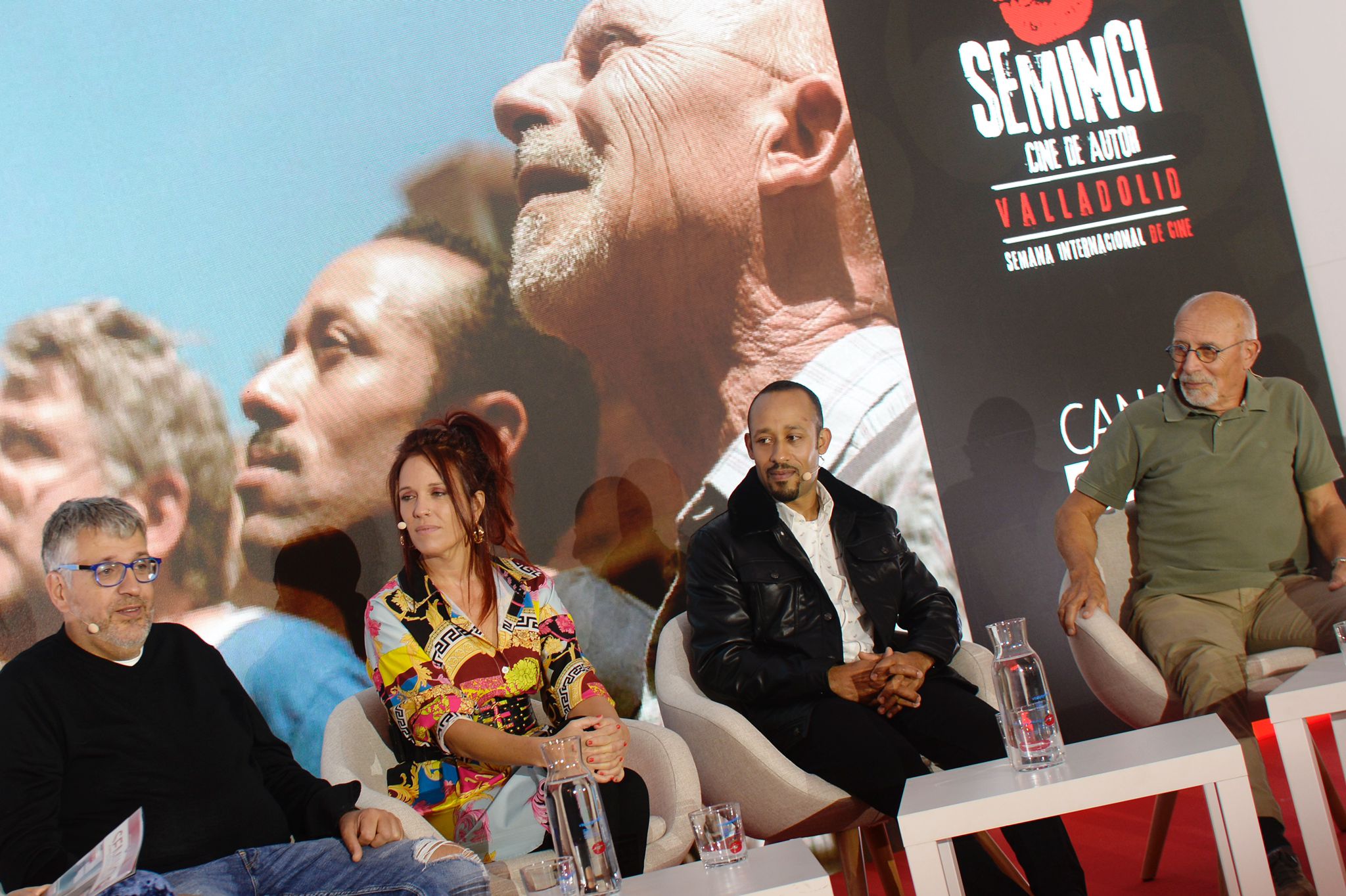“At the origin of this film there is a desire to explore the world of work. My mother’s partner is a plumber, and he always told us many of the things that happened to him when he went to people’s houses… So this is a film about how we live, about the diversity of families and homes in our country.” With these words, Catalonian director Neus Ballús appeared at a press conference today Tuesday 26th October 2021 in the Hall of Mirrors at Calderón Theatre, to talk about what had moved her to shoot her third feature film, Sis Dies Corrents [Six Ordinary Days], a film halfway between a documentary and a comedy that combines fiction with elements of everyday life, and in which there is realism, drama and a peculiar type of humour.
Neus Ballús went to Valladolid accompanied by the three stars of the film and producer Miriam Porté: “To find out who I wanted to accompany me in the film, I went to the Barcelona Pumbers’ Guild, where I saw more than a thousand people.” Ballús wanted them to be workers, not professional actors. When she chose Valero Escolar and Mohamed Mellali, she heldpreparatory meetings with them for two years to write a script that was adapted to their acting abilities, although she also left them free to improvise.
Valero Escolar recalled that, at first, he thought that Neus Ballús was doing her final year thesis. “I told my wife: if she calls me, I’ll give her a hand. Then I saw that she was a real film director…,” he commented. For Escolar, who joined the project with many doubts about his own acting ability, this is “a film by street people for street people, in which everyone has a story to tell.” Mohamed Mellali also doubted at first that the film was serious. And Pep Sarrà, commented that he didn’t know how Neus Ballús had found him, as he was retired. “But she found me. I told her: don’t give me texts because I’m going to make a mess… and she let me do it and be myself.”
“When we started shooting, there were times when I went home a bit pissed off, because I thought I hadn’t given the director what she wanted. You had to improvise, something that in real life comes out on its own, and you live it, but here… The shooting was complicated, there were many emotions, but it also created excitement, the excitement of making the film…,” said Escolar. “It was like going to work for real. We didn’t know each other beforehand, but we were from the trade and it felt like we had always known each other,” seconded Pep Sarrà.
Producer Miriam Porté admitted that, from the beginning, Neus Ballús’ project seemed interesting and beautiful to her, although it was risky to bet on a film that was going to be shot over an uncertain and lengthy process. “It opened up questions, it was unsettling to work in this way, with such sensitive, unpredictable, fragile material…”
Ballús explained that the shoot had been long, but with a work plan that included aspects such as building trust with the actors, so that they could express themselves naturally. “I had to write a tailor-made film for them, take them to different emotional moments, because the clients of the houses where they were going to work were not actors either. We set up real breakdowns, in the houses, so that they would have to repair them for real. We had to create a fictional environment that they felt was real. We went to shoot every day without really knowing what was going to happen. That’s how they managed to create that “spirit of freshness and uncertainty” that permeates the film.
For the director, as for the actors, in Sis Dies Corrents “life expresses itself.” “It’s a film about real people who talk about themselves or from their viewpoints, in somewhat unpredictable situations. You had to direct without knowing what was going to happen, and trust that there would be surprises. Forcing the actors to go in one direction would have killed their sincerity,” Ballús said.
The director said that the editing, which lasted nine months, had been particularly difficult: “There were over 70 hours of filming, with takes of more than 15 minutes.” Miriam Porté, the producer, also described the editing as “a work of goldsmithing, in which a lot of fine-tuning had to be done to make the whole thing believable.”
The film is having its Spanish premiere at this 66th edition of the Seminci Festival, after its world premiereat the Locarno Festival, where it won the award for best male performance (ex aequo for Mohamed Mellali and Valero Escolar), the Europa Cinemas Label award given by a jury of exhibitors to the best European film, and a special mention from the young independent jury.
Sis Dies Corrents will be screened today Tuesday 26th at 19.00h at the Carrión and Calderón theatres, and tomorrow Wednesday at 22.30h at Broadway Cinemas.



























![Logo Foro Cultural de Austria Madrid[1]](https://www.seminci.com/wp-content/uploads/2024/09/Logo-Foro-Cultural-de-Austria-Madrid1-300x76.jpg)








